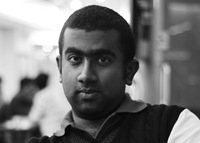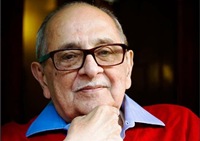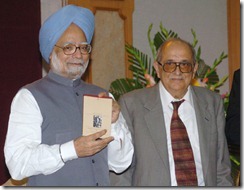Fali Nariman
Mint reported that Justice Anil R Dave, who’s heading the five-judge constitution bench that will hear challenges to the National Judicial Appointments Commission (NJAC) Act, today recused himself from the case:
The move came after senior lawyer Fali S Nariman, who represents lawyers body and petitioner Supreme Court Advocates-On-Record Association, raised an objection. He argued that after a 13 April notification by the government which brought into force the NJAC Act, Justice Dave became part of the commission whose validity has been challenged.
Attorney general Mukul Rohatgi called the objection raised by Nariman “unfounded” and “completely condemnable”.
The proposed National Judicial Appointments Commission’s (NJAC) validity will now be examined by a Constitution bench in the Supreme Court after a three judge bench referred petitions challenging it to a five judge bench, reported//Mint.
The Supreme Court Advocates on Record Association, the Bar Association of India and several individual lawyers had challenged the NJAC Act on the ground that not only did it threaten the independence of the judiciary but also that the parliament was not competent to pass it because the constitutional amendment giving it such power had not come into effect.
Senior advocate Fali Nariman had argued before the bench of justices Anil R Dave, J Chelameswar and Madan B Lokur that there was a substantial question of law involved in the case, which could be considered only by a constitution bench.
The All India Bar Association (AIBA) has has requested the Supreme Court’s secretary general to issue contempt proceedings against Tamil TV news channel, Thanthi, for apparently having broadcast live the arguments of Fali Nariman successfully arguing for J Jayalalithaa’s bail in the Supreme Court, reported the Business Standard.
AIBA chairman Adish C Aggarwala said: “It is inappropriate and contemptuous to record and telecast court proceedings. The telecast of Fali Nariman’s arguments in Jayalalithaa bail matter in the Supreme Court by Thanthi Television on October 18 is contemptuous and the Supreme Court of India should take stern action of contempt of court against all concerned who are responsible for its recording and telecast.”
Also see: Very topical John Oliver on US live Supreme Court TV reporting, via @logic on Twitter
The Supreme Court Friday granted bail to former Tamil Nadu chief minister J Jayalalithaa, convicted of possessing assests disproportionate to her known sources of income.
Alongwith Jayalalithaa, her aide Sasikala Natarajan and two others have also been granted bail.
PTI tweeted: “Jaya volunteered before SC to be kept in confinement in house for 2-3 months while pressing for bail.”
Update: However, the final order by the court, which has now been published, does not specify house arrest as a condition.
An apex court bench headed by Chief Justice HL Dattu said that all four will be released on bail subject to the satisfaction of the condition by the trial court.
The court made it clear that Jayalalithaa and three others will complete their appeal with all relevant documents before the high court in a matter of two months and thereafter, it will ask the high court to expedite and complete the hearing on the appeal within three months.
The court told senior counsel Fali Nariman, who appeared for Jayalalithaa after Ram Jethmalani had represented her in the Karnataka high court bail plea, that it will not grant a day more to his client if they don’t complete the paperwork of their appeal before the high court with all the documents within a span of two months.
Jayalalithaa is presently in a Bangalore jail after her conviction in the disproportionate assets case. The former chief minister was awarded four-year prison term and a fine of Rs.100 crore.
She had moved to the Supreme Court Oct 9 seeking the bail.
Jayalalithaa, along with her aide Sasikala Natrajan, VK Sudhakaran and J Ilavarasi, Oct 7 were refused bail by the Karnataka high court which held that there were no grounds for granting bail.
Besides her health grounds, Jayalalithaa has invoked section 389 of the Code of Criminal Procedure seeking the suspension of her sentence and grant of bail till the pendency of her appeal against the trial court order.
The high court Oct 7, while declining bail to Jayalalithaa and three others, had relied on apex court orders as it ruled that putting the sentence on hold after an appeal is filed against the trial court order was not automatic. It had said that plea for bail after the conviction was different from the plea for bail while the trial was on.
It had also cited the apex court ruling that “corruption amounts to violation of human rights and leads to economic imbalances”.
In the 18 year old disproportionate assets case, the trial court in Bangalore Sep 27, convicted Jayalalithaa for possessing assets disproportionate to her known sources of income and sentenced her to four jail term and Rs. 100 crore fine.
The case against Jayalalithaa and three others related to period from 1991 to 1996 involving Rs. 66.65 crores when she became chief minister for the first time.
Senior counsel Fali Nariman has added another to the four public interest litigations (PILs) against the National Judicial Appointments Commission (NJAC), which will be heard on Monday.
Together with advocate Subhash Sharma, he claimed that the constitutional amendment “severely affects and damages the basic structure of the Constitution viz the independence of the judiciary” and gives “unbridled power” to parliament, reported the Indian Express.
Allowing for any two out of three non-judicial members of the NJAC to scuttle appointments would take away from primacy of the opinion of the three senior Supreme Court judges on the NJAC. The law was counter to the nine-judge constitution bench judgment in the so-called Second Judges case - one of three cases that was fundamental in the establishment of the collegium system.
 Delhi lawyer Prashant Reddy argues that many of the plans for reforming the Indian courts fail to see the most fundamental problem - a lack of transparency – and proposes several ideas to fixing it.
Delhi lawyer Prashant Reddy argues that many of the plans for reforming the Indian courts fail to see the most fundamental problem - a lack of transparency – and proposes several ideas to fixing it.
A few days ago the Financial Express did a long interview with senior advocate and former parliamentarian Fali Nariman.
The chat covers a dozen topics, including Nariman's fear of modern Hinduism's intolerance, how a Narendra Modi prime minister would affect the courts and constitution, judicial reforms, Lokpal and more. Well worth a read. [Financial Express] [via @AparatBar on Twitter]
 Fali Nariman and PP Rao have completed their recommendations to the Supreme Court in what procedure to follow in case of sex harassment allegations against sitting and former judges.
Fali Nariman and PP Rao have completed their recommendations to the Supreme Court in what procedure to follow in case of sex harassment allegations against sitting and former judges.
 The fact that a Lokpal bill did get passed at all, should give pause for thought.
The fact that a Lokpal bill did get passed at all, should give pause for thought.
Just a week after senior advocate Fali Nariman declined to be part of the Lokpal search committee, former Supreme Court judge KT Thomas has also told the government he didn’t want to head the search committee that would find candidates to head the anti-corruption ombudsman body.
The names of senior advocates Fali S Nariman, K K Venugopal, Harish Salve and attorney general Goolam Vahanvati have been forwarded in the category of “eminent jurist” to the Lokpal selection panel, alongside former attorney generals Soli Sorabjee and K Parasaran.
They will be discussed in a meeting scheduled for 3 February, reported the Indian Express:
The Lokpal will consist of a chairperson and a maximum of eight members, of which 50 per cent shall be judicial members and the rest shall be from among SCs, STs, OBCs, minorities and women. The selection committee has to have Prime Minister, Lok Sabha Speaker, Leader of the Opposition in the Lok Sabha and the Chief Justice of India. A fifth member of the selection committee for selection of Lokpal has to be nominated under the category of “eminent jurist”. These four members will co-opt the fifth member under this category. So far, names of six jurists have been doing the rounds for selection as the fifth member.
 The Society of Indian Law Firms (SILF) pledged its support for senior advocate Fali S Nariman to become president of India, in a press release yesterday.
The Society of Indian Law Firms (SILF) pledged its support for senior advocate Fali S Nariman to become president of India, in a press release yesterday.
Either the Times of India thinks that only advocates are lawyers or that law firm lawyers are just not so very top.
While I certainly would not dare disagree with the calibre and legal genius of each of these individuals, could not at least one law firmite have made it to the list?
Here's TOI's full list of top 10 lawyers, along with our nutshell summary of the paper's often brilliant commentary on each:- Fali Nariman
The "wise man of the Bar" with a stature that "allows him to be blunt in court". - Soli J Sorabjee
Former glorious AG, fierce free speech and HR advocate, "mad 'bawa' (Parsi) jokes", successful daughter. - Harish Salve
The "legal robot" and all-round legal talent. - K. Parasaran
"Articulate" and "ethically driven" "man for all seasons". - Ram Jethmalani
Passionate about crimes with "rapier-sharp wit", proving crime does pay. - Abhishek Manu Singhvi
"Buddha of the Bar", youngest additional solicitor general ever and happy enabler of all tricolor-wavers. - Mukul Rohatgi
Voluble "king" of Delhi HC and Anil's gas dispute trusted counsel. - K.K. Venugopal
"Constitutional crorepati", Emergency counterweight and collector - but where's the grey hair? - Rohinton F Nariman
Cheerful corporate stalwart, fast riser to senior counsel, Fali's son. - Ashok Desai
Reclusive former AG, softly-spoken but packing a serious punch and control.
Possible explanations:
- court-room work is simply more glamorous than the desk-bound transactional variety,
- the ones on the list really are a league apart that law firmites have not yet been able to match, or
- the TOI did not read the Lawyers Collective judgment that "legal practice" includes desk-work.
For Times of India's full list click here - it's a very entertaining read that brings out many a wonderful personality!
Karnataka Chief Justice P D Dinakaran elevation to the Supreme Court has been called into question following protests by eminent lawyers over his unaccountable ownership of 400 acres of land in rural Tamil Nadu.
The Chief Justice of India has sought an explanation from Justice Dinakaran acting on a letter submitted by prominent lawyers such as Shanti Bhushan, Fali Nariman, Anil Divan, Ashok Desai and Ram Jethmalani in which they demanded his promotion to be deferred.
Fali Nariman declined to comment when contacted by Legally India, saying that this matter could only be resolved by a sitting judge of the Supreme Court.
President of the Supreme Court Bar Association M N Krishnamani and the Delhi High Court Bar Association President K C Mittal in a joint statement demanded a change in the existing collegiums system of appointment of judges.
The bar associations have urged the Law Ministry to increase transparency and objectivity in the promotion of judges to the Supreme Court.
They have proposed a constitutional amendment to replace the collegiums system by a properly constituted National Judicial Commission to undertake the selection.
Madras High Court bar association members who have opposed Justice Dinakaran’s promotion include K R Tamizhmani, R Vaigai, Sriram Panchu, Anna Mathew, S S Vasudevan, Geetha Ramaseshan, Sudha Ramalingam, N L Rajah, D Nagasaila, S Devikarani and T Mohan.
As reported by the Times of India, the collegiums headed by the Chief Justice of India and Justice S H Kapadia, B N Agrawal, Tarun Chatterjee and Altamas Kabir will meet tomorrow to discuss on the future course of action.
Under the present collegiums system the CJI is the final authority in the matter of appointments superseding the executive also.